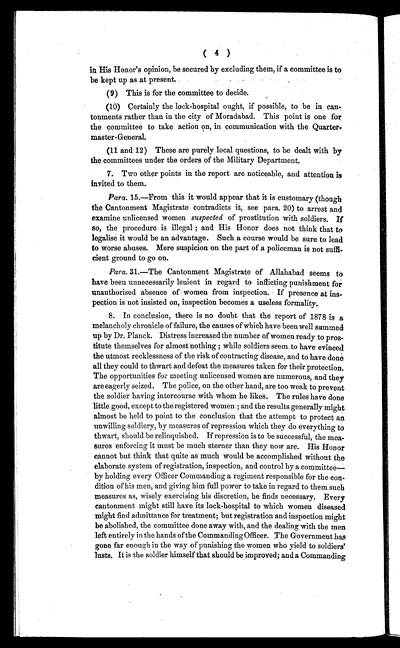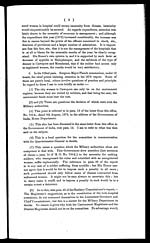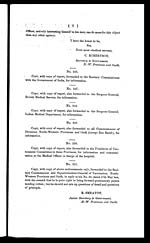Medicine - Institutions > Lock hospitals > Annual report on the working of the lock hospitals in the North-Western Provinces and Oudh > Fifth annual report of the working of the lock-hospitals in the North-Western Provinces and Oudh for the year 1878
(188) Page 4
Download files
Individual page:
Thumbnail gallery: Grid view | List view

( 4 )
in His Honor's opinion, be secured by excluding them, if a committee is to
be kept up as at present.
(9) This is for the committee to decide.
(10) Certainly the lock-hospital ought, if possible, to be in can-
tonments rather than in the city of Moradabad. This point is one for
the committee to take action on, in communication with the Quarter,
master-General.
(11 and 12) These are purely local questions, to be dealt with by
the committees under the orders of the Military Department.
7. Two other points in the report are noticeable, and attention is
invited to them.
Para. 15.—From this it would appear that it is customary (though
the Cantonment Magistrate contradicts it, see para. 20) to arrest and
examine unlicensed women suspected of prostitution with soldiers. If
so, the procedure is illegal; and His Honor does not think that to
legalise it would be an advantage. Such a course would be sure to lead
to worse abuses. Mere suspicion on the part of a policeman is not suffi
cient ground to go on.
Para. 31.—The Cantonment Magistrate of Allahabad seems to
have been unnecessarily lenient in regard to inflicting punishment for
unauthorised absence of women from inspection. If presence at ins-
pection is not insisted on, inspection becomes a useless formality.
8. In conclusion, there is no doubt that the report of 1878 is a
melancholy chronicle of failure, the causes of which have been well summed
up by Dr. Planck. Distress increased the number of women ready to pros
titute themselves for almost nothing; while soldiers seem to have evinced
the utmost recklessness of the risk of contracting disease, and to have done
all they could to thwart and defeat the measures taken for their protection.
The opportunities for meeting unlicensed women are numerous, and they
are eagerly seized. The police, on the other hand, are too weak to prevent
the soldier having intercourse with whom he likes. The rules have done
little good, except to the registered women ; and the results generally might
almost be held to point to the conclusion that the attempt to protect an
unwilling soldiery, by measures of repression which they do everything to
thwart, should be relinquished. If repression is to be successful, the mea-
sures enforcing it must be much sterner than they now are. His Honor
cannot but think that quite as much would be accomplished without the
elaborate system of registration, inspection, and control by a committee—
by holding every Officer Commanding a regiment responsible for the con-
dition of his men, and giving him full power to take in regard to them such
measures as, wisely exercising his discretion, he finds necessary. Every
cantonment might still have its lock-hospital to which women diseased
might find admittance for treatment; but registration and inspection might
be abolished, the committee done away with, and the dealing with the men
left entirely in the hands of the Commanding Officer. The Government has
gone far enough in the way of punishing the women who yield to soldiers'
lusts. It is the soldier himself that should be improved; and a Commanding
Set display mode to: Large image | Zoom image | Transcription
Images and transcriptions on this page, including medium image downloads, may be used under the Creative Commons Attribution 4.0 International Licence unless otherwise stated. ![]()
| Permanent URL | https://digital.nls.uk/75111396 |
|---|




